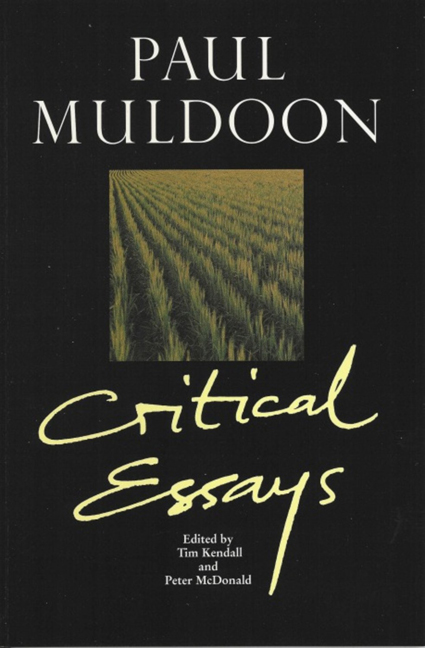Book contents
- Frontmatter
- Contents
- Acknowledgements
- Notes on Contributors
- Introduction
- ‘Thirteen or Fourteen’: Paul Muldoon's Poetics of Adolescence
- Never Quite Showing his Hand: Robert Frost and Paul Muldoon
- For Father Read Mother: Muldoon's Antecedents
- Pax Hibernica/Pax Americana: Rhyme and Reconciliation in Muldoon
- Muldoon and Pragmatism
- ‘All That’: Muldoon and the Vanity of Interpretation
- Paul Muldoon's Transits: Muddling Through after Madoc
- ‘All Art is a Collaboration’: Paul Muldoon as Librettist
- Muldoon's Remains
- Index
Muldoon and Pragmatism
- Frontmatter
- Contents
- Acknowledgements
- Notes on Contributors
- Introduction
- ‘Thirteen or Fourteen’: Paul Muldoon's Poetics of Adolescence
- Never Quite Showing his Hand: Robert Frost and Paul Muldoon
- For Father Read Mother: Muldoon's Antecedents
- Pax Hibernica/Pax Americana: Rhyme and Reconciliation in Muldoon
- Muldoon and Pragmatism
- ‘All That’: Muldoon and the Vanity of Interpretation
- Paul Muldoon's Transits: Muddling Through after Madoc
- ‘All Art is a Collaboration’: Paul Muldoon as Librettist
- Muldoon's Remains
- Index
Summary
In this essay I want to look at the way Paul Muldoon, following Robert Frost, complicates the reading experience in a particular way, and I want to relate this complicating process, and the desire on behalf of both poets to activate it, to the influence of American pragmatism, particularly the influence on Frost of William James, and of Frost in turn on Muldoon. This complicating process, as I call it, settles on how both writers make it possible for the reader to read them quickly, while at the same hinting that a slower reading might be preferable, or even that a combination of slow and quick readings might be the most desirable.
For Frost and Muldoon, the question of the time we spend with their poetry and the time we spend away from their poetry is an important one. If a writer makes the surface of his or her poetry look smooth (perhaps encouraging the reader to skate over thin ice), it means that he or she takes the superficial level of the poetry seriously. To quote Charles Simic quoting Paul Valéry: ‘We understand each other according to the speed with which we pass over words.’ Frost and Muldoon often write poems which it is possible to read quickly, but this possibility goes along with, indeed reinforces, the impossibility of understanding them quickly.
Muldoon's debt to Frost is one that he has always been happy to acknowledge in interview: ‘I don't say it idly that Frost is a big influence on me – though there are other influences. But I think it's pretty obvious that I'm close to him.’ Several of his poems include quotations from, and allusions to, the American's work. One early example from Mules, and one which illustrates the centrality of slow and quick readings, is ‘The Country Club’. This includes seven lines from Frost's poem ‘The Mountain’:
‘But what would interest you about the brook,
It's always cold in summer, warm in winter.’
‘Warm in December, cold in June, you say?’
Doc Pinkerton was a great one for chapter and verse.
‘I don't suppose the water's changed at all.
You and I know enough to know it's warm
Compared with cold, and cold compared with warm,
But all the fun's in how you say a thing.’
- Type
- Chapter
- Information
- Paul MuldoonCritical Essays, pp. 96 - 109Publisher: Liverpool University PressPrint publication year: 2004



